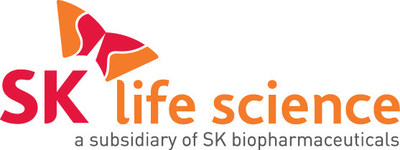

FAIR LAWN, N.J., Dec. 3, 2018 /PRNewswire/ -- SK Life Science, Inc., a subsidiary of SK Biopharmaceuticals Co., Ltd., an innovative biopharmaceutical company focused on developing and bringing to market treatments for central nervous system (CNS) disorders, announced results of a large, Phase 3, multicenter, open-label safety study of its lead investigational antiepileptic drug, cenobamate (YKP3089), at the American Epilepsy Society (AES) Annual Meeting in New Orleans (November 30 – December 4).

Two previous pivotal, randomized, double-blind, placebo-controlled studies evaluated the efficacy and safety of cenobamate in adult patients with partial-onset seizures. During this clinical development program, a serious, delayed hypersensitivity adverse event, DRESS (drug reaction with eosinophilia and systemic symptoms) syndrome, emerged. The large, international, multicenter, open-label safety study was designed to mitigate the rate of DRESS syndrome. No cases of DRESS syndrome were identified in 1,339 patients exposed to cenobamate using a lower starting dose and slower titration.
"Every epileptologist's goal is to help patients achieve seizure freedom and to do so safely," said Michael Sperling, MD, of Jefferson Comprehensive Epilepsy Center at Thomas Jefferson University in Philadelphia. "These results may provide additional information on how to titrate cenobamate for the treatment of partial-onset seizures in adults."
Patients in the safety study were 18-70 years old and taking stable doses of one to three antiepileptic drugs. Increasing daily doses of cenobamate were administered (12.5 mg, 25 mg, 50 mg, 100 mg, 150 mg and 200 mg/day) at two-week intervals with further increases to 400 mg/day using biweekly increments of 50 mg/day allowed. The most common adverse events were somnolence, dizziness and fatigue. Serious adverse events, with hospitalizations for seizure being the most common, were observed in 114 (8.5%) patients who had treatment-resistant partial seizures taking multiple antiepileptic drugs.
Additional Presentations on Cenobamate
SK life science will also present four additional cenobamate posters at the meeting. One poster will provide a new analysis of data from two multicenter, randomized, placebo-controlled trials of cenobamate that suggest partial (focal) seizure reduction begins with doses as low as 50-100mg/day and as early as two weeks after a starting dose of 50 mg. Researchers will also share data from a nonclinical study examining cenobamate's effect on GABAA receptor-mediated currents, which, combined with its effects on inhibiting the persistent component of the sodium current, suggest a dual mechanism of action.
Two additional poster presentations, including new pharmacokinetic and pharmacodynamic information on cenobamate, are listed in the below table.
Presentation dates and times are as follows:
Poster Session 1, #1.303 | Saturday, December 1 | "Safety of Cenobamate (YKP3089) as Adjunctive Treatment for Uncontrolled Partial Seizures in a Large, Multicenter, Open-Label Study" -Dr. Michael Sperling |
Poster Session 2, #2.248 | Sunday, December 2 | "Time to Onset of Efficacy in Seizure Reduction With Cenobamate (YKP3089) in Patients With Uncontrolled Partial Seizures From 2 Randomized Clinical Trials" |
Poster Session 3, #3.304 | Monday, December 3 | "Pharmacokinetics and Safety of Cenobamate in Non-Epileptic Special Populations: Effect in Hepatically Impaired and Elderly Subjects" -Dr. Kelli J. Glenn |
Poster Session 3, #3.306 | Monday, December 3 | "Effects of Cenobamate on GABA-A Receptor Modulation" -Dr. Ramesh Sharma |
Poster Session 3, #3.307 | Monday, December 3 | "Pharmacodynamic and Pharmacokinetic Interactions Between Cenobamate and Alcohol in Healthy Subjects" -Dr. Laurent Vernillet |
"In the U.S. alone, there are 3.4 million people living with epilepsy, and an estimated 1.8 million adults are still seizing," said Marc Kamin, M.D., chief medical officer at SK life science. "Research presented at AES shows our continued focus on meeting developmental and clinical milestones for cenobamate with the goal of providing a new treatment option for people with uncontrolled epilepsy."
About Epilepsy
Epilepsy is a common neurological disorder characterized by seizures.i There are approximately 3.4 million people in the U.S. living with epilepsy, and approximately 65 million worldwide.ii The majority of people with epilepsy (60%) have partial-onset seizures, which are located in just one part of the brain.iii People with epilepsy are also at risk for accidents and other health complications including falling, drowning, car accidents, depression and anxiety and sudden unexplained death in epilepsy (SUDEP).iv Despite the availability of many antiepileptic therapies, at least 1 in 3 people with epilepsy are not able to control their seizures through treatment.v
About SK life science
SK Life Science, Inc., a subsidiary of SK Biopharmaceuticals, Co., Ltd., is focused on developing and commercializing treatments for disorders of the central nervous system (CNS). Both are a part of the global conglomerate SK Group, the second largest company in Korea. SK life science is located in Fair Lawn, New Jersey.
We have a pipeline of eight compounds in development for the treatment of CNS disorders including epilepsy, sleep disorder and attention deficit hyperactivity disorder, among others. The first product the company is planning to commercialize independently is cenobamate (YKP3089), an investigational compound for the potential treatment of partial-onset seizures in adult patients, currently in a Phase 3 global clinical trial.
For more information, visit SK life science's website at www.SKLifeScienceInc.com.
For more information, visit SK biopharmaceuticals' website at www.skbp.com/eng.
i Epilepsy Foundation. What Is Epilepsy? https://www.epilepsy.com/learn/about-epilepsy-basics/what-epilepsy Accessed November 20, 2018.
ii Epilepsy Foundation. Facts about Seizures and Epilepsy. https://www.epilepsy.com/learn/about-epilepsy-basics/facts-about-seizures-and-epilepsy Accessed November 20, 2018.
iii National Institute of Neurological Disorders and Stroke. The Epilepsies and Seizures: Hope through Research. https://www.ninds.nih.gov/Disorders/Patient-Caregiver-Education/Hope-Through-Research/Epilepsies-and-Seizures-Hope-Through#3109_9 Accessed November 20, 2018.
iv Epilepsy Foundation. Staying Safe. https://www.epilepsy.com/learn/seizure-first-aid-and-safety/staying-safe Accessed November 20, 2018.
v Epilepsy Foundation. Facts about Seizures and Epilepsy. https://www.epilepsy.com/learn/about-epilepsy-basics/facts-about-seizures-and-epilepsy Accessed November 20, 2018.
Media Contact:
media@sklsi.com
SOURCE SK Life Science, Inc.
